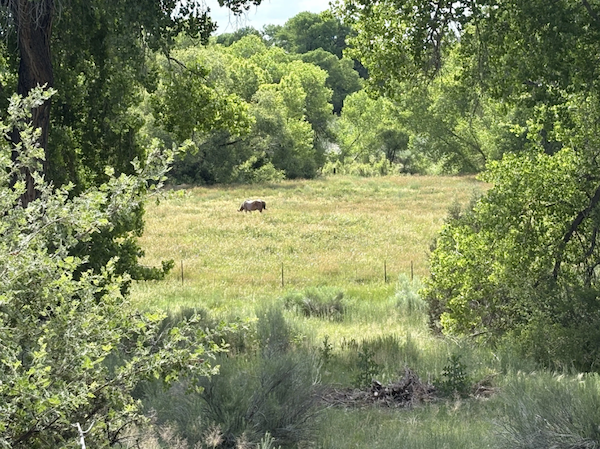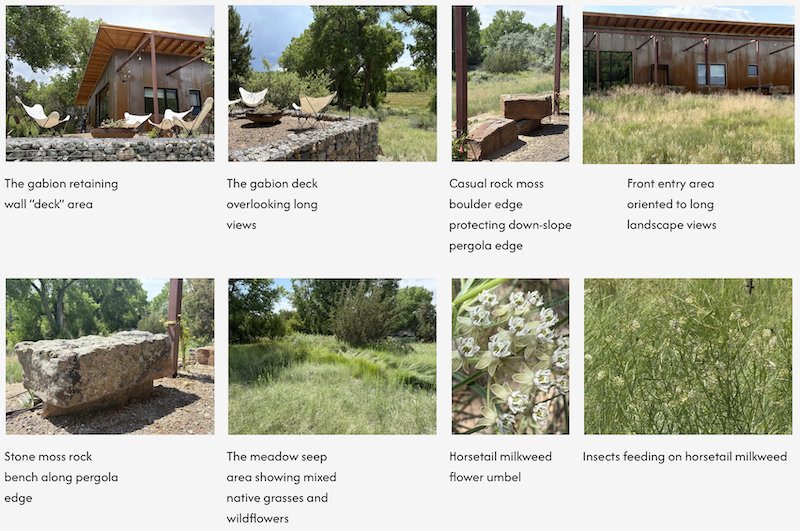|
Over the past two years, I’ve had the opportunity to work with Veree Parker-Simon, principal architect at PREDOCK, on her recently completed home in La Cienega, NM. We are nearly done with the basic elements and relationships for landscape. There’s still a bit of steel work to be finished before we can heal over areas of disturbed soil with native grass seed, and recently planted fruit trees, and flowering vines haven’t yet filled in, so things are still pretty ‘raw’, as gardens go. In fact, it’s barely photogenic at this point, but I decided it’s still very much worth showing because it is a good example of planned environmental protection. This doesn’t happen often enough.
La Cienega is a unique environment in term of local hydrology, soils, and the plant communities and wildlife it supports. I’m not sure how the area got to be so lucky as to have several hundred acres of undeveloped land under protective management today, but El Rancho de Las Golondrinas (The Ranch of the Swallows) as well as adjoining private land holdings are currently involved. “The La Cienega area is unique as a confluence of surface flows from storm water and snow melt and includes an exceptional concentration of seeps and springs, slope wetlands and “cienegas” (the Colonial Spanish word for marsh), which are primarily groundwater fed and flow at the surface. Mid-elevation, alkaline cienegas are created by springs and seeps that saturate surface and subsurface soils over a large area supporting a lush wet meadow (Sivinski and Tonne, 2011). An example of this type of wetland within the La Cienega project area is located at the Leonora Curtin Wetland Preserve, in the Canorita de las Bacas drainage (Figure 1.2). Groundwater-fed wetlands in semi-arid landscapes, especially those that form large cienega complexes, are among the most diminished and threatened ecosystems in the arid southwest. Of all the southwestern states, the cienegas of New Mexico are the least studied and documented in the literature (Sivinski and Tonne, 2011). https://www.env.nm.gov/wp-content/uploads/sites/25/2019/05/Part-1-from-Pages-from-LaCienegaBook_2-28-2013.pdf La Cienega also feels special, and with an opportunity to build a home there, Veree & company did so with an established connection to the landscape. Prior to their new build, the family lived on a neighboring property in a renovated guest house that was itself an upgraded livestock shelter surrounded by lush native landscape. I would describe her vision for her new home and landscape as similarly immersive—an environment with no clear boundaries or sense of restriction. In Veree’s own words: “My landscape environment is more important to me than the building”. She’s also been using the word ‘romantic’ a lot lately - which is even more unexpected coming from an architect. At the center of her planning was a particularly lush existing meadow down-slope of the building site. The house was oriented to it, a large pergola added to frame it, and her intention was to have it to run right up slope to the edge to the house entry area (the area framed by the pergola). This would seem so simple, and yet it did not come without a few twists and turns. Preserving the meadow became something of a challenge, as it meant giving up fully accessible space directly in front of the house. Native grasses and wildflowers don’t tolerate the soil compaction and general abuse foot traffic brings. No one can say what the tipping point is going to be, but weeds and invasive trees are a certainty in degraded arid landscapes, and once the damage has been done, it takes considerable effort to reverse. This conflict between the vulnerability of the existing meadow (my obsession) and the family vision of being in nature with complete freedom, ignited a 2-year design debate - out of which emerged some pretty strict aesthetic ‘rules’. The number one rule was no overt physical barriers. That was a tough one, but as I reflect on it now, it was really central to the larger vision, and desired emotional experience. Ultimately, the solutions were found in subtle redirections (garden nodes) and paying close attention to old and new desire lines (informal, user-created paths). Although I still feel the meadow is vulnerable, we did also find an effective and affordable way to control traffic along the pergola edge using very large rectilinear moss rock boulders. Because we naturally follow the path of least resistance, the boulder spacing introduces just enough tension to convince you to just move to either end rather than squeeze through and crash down the hill randomly. Some of the boulders were stacked into benches, and others have been useful as ‘drop’ spots, so they don’t feel like a barricade, but a handy resource. I also think they work well within that big sense of space. Veree really nailed the romantic landscape with the oversized pergola. It ‘communicates’ well with the long views across the meadow seeps, ditches, pasture and cottonwood groves beyond. The boulders correspond. They’re just a little unexpectedly big. We also extended an elevated seating area, a ‘perch’, from the far ‘quiet’ end of the pergola area. My theory is that floating over the meadow helps convince you that you are best right where you are. It allows you to feel that you are fully in the space, but without being on it. It also functions like an ‘infinity edge’ in that it brings the eye up and beyond, which is a really good desert landscape trick for relieving the eye of any dry patchy foreground issues. So, that’s the brief and partial story of preserving one small patch of heaven. It’s been my goal to present examples of designed landscape environments, specifically desert environments, that might help inspire people to build differently and with more ecological sensitivity. This project actually began with a vision rooted in preservation, which is ideal. I hope it survives this way for a very long time.
2 Comments
Sara Wright
8/29/2025 06:35:21 am
This is a wonderful article - i am familiar with the area and fell in love with it while living in Abiquiu - I am a naturalist ethologist etc not an architect but I have treated my land as teacher working with her learning from her from the beginning 40 plus years ago - as things very changing … I continue to learn each day what Nature wants me to do - consequently I have an inyimste relationship with the land as you obviously do - I hope many readers will be inspired… thank you
Reply
9/7/2025 06:03:46 pm
Hi Sara, thank you for your comments. Much appreciated! La Cienega actually feels a lot like Abiquiu. I thought about that uncanny similarity while writing. Not sure if that's the right word, but you reminded me of it:))
Reply
Your comment will be posted after it is approved.
Leave a Reply. |
Submit your ideas for local feature articles
Profiles Gardening Recipes Observations Birding Essays Hiking AuthorsYou! Archives
October 2025
Categories
All
|


 RSS Feed
RSS Feed